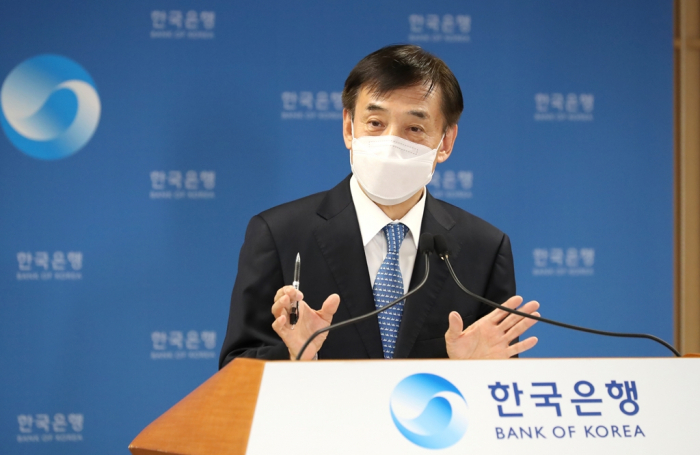The Bank of Korea needs to drop its accommodative monetary stance of the past two years and to begin raising interest rates from this year, the central bank's governor said on Thursday.
"We need to normalize monetary policy in an orderly manner, at an appropriate time within the year," Bank of Korea Governor Lee Ju-yeol told reporters on the sidelines of the central bank's inflation policy review meeting.
"It's natural to normalize monetary policy in sync with economic recovery," he said, noting mounting inflationary pressure, surging private debt and massive money inflow into the investment markets.
It was the first time for the central bank governor to give a rough timetable for its first interest rate increase since shifting to monetary easing steps by cutting the base rate by 25 basis points to 1.5% in July 2019. It has kept interest rates at a record low of 0.5% since May of last year.
"The current monetary policy is substantially accommodative. Even if we raise the base rate once or twice, our monetary policy will still be seen as accommodative," Lee said.
His remarks were interpreted by some economists as a signal of additional rate hikes next year.
A policy rate increase, if it goes through, will mark the Bank of Korea's first such move since it pulled the base rate by 25 basis points to 1.75% in November 2018.
Since last month, the governor has been stepping up his rhetoric on the need to normalize the loosened monetary bias. Earlier this month, Lee flagged a tighter monetary policy for the second time in less than a month, fueling expectations that the bank will raise rates earlier than expected, possibly in the fourth quarter.
His hawkish remarks follow a recent run of robust economic data. South Korea's consumer inflation in May quickened by the fastest pace in more than nine years of 2.6%, topping the central bank's 2% target for two straight months.
The country's exports in May expanded by the most in more than three decades.
"The fast pace of economic recovery will put upward pressure on inflation, which will likely exceed the BOK's forecast of 1.8%," Lee noted.
"We also took note of massive money inflow into the investment market and the surge in household debt. We need to pay attention to the finance imbalance when implementing monetary policy."
On Wednesday, the central bank ratcheted up its warning over the asset price bubble and private debt.
Private debt in South Korea, combining both household and corporate debt, marked its highest ratio against the nominal gross domestic product (GDP) since the central bank began compiling the data in the first quarter of 2000.
The governor, however, dismissed some market views that the central bank's recent comments are out of sync with the government's steps to draw up an additional supplementary budget in the 30 trillion won ($26 billion) range.
"Harmonizing monetary and fiscal policies does not necessarily mean they need to be implemented in the same direction and with a similar intensity," the governor said.
The ideal policy mix would be that monetary policy is carried out to remove the side effects of prolonged low interest rates, with fiscal policy focusing on supporting low-income families, he added.
Write to Ik-hwan Kim at lovepan@hankyung.com
Yeonhee Kim edited this article.



